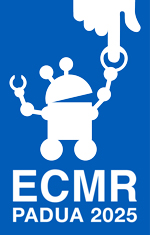Luis Merino, School of Engineering, Pablo de Olavide University, Seville, Spain
Mauro Martini, Department of Electronics and Telecommunications, Politecnico di Torino, Torino, Italy
Noé Pérez-Higueras, School of Engineering, Pablo de Olavide University, Seville, Spain
Luis J. Manso, College of Engineering and Physical Sciences, Aston University, Birmingham, UK.
Fernando Caballero, School of Engineering, Pablo de Olavide University, Seville, Spain
Marcello Chiaberge, Department of Electronics and Telecommunications, Politecnico di Torino, Torino, Italy
Advances and Challenges in Robot Social Navigation
Tuesday, 2 September 2025
About the Workshop
FULL DAY
Social navigation of service robots in human-populated environments is a key challenge to enable autonomous robotic platform to support humans in their daily lives. Recent research on Machine Learning (ML) and Artificial Intelligence (AI) has increasingly focused on equipping robots with the
ability to perceive, interpret, and adapt to complex social dynamics, enabling them to coexist safely with humans. Emerging methodologies leverage Large Vision Language models, reinforcement learning, and hybrid AI-model-based control systems to enhance robot navigation capabilities. For instance, multi-modal data processing enables robots to predict human trajectories, recognize social cues, and optimize navigation paths in real time. These approaches also prioritize safety, efficiency, and user comfort, aligning with the nuanced demands of real-world applications. Despite these advances, significant challenges remain to achieve truly robust social navigation. One core challenge is defining and implementing the expected behaviors that balance navigation efficiency, friendliness, and safety, to ensure that robots navigate without causing discomfort. Moreover, standardizing metrics for evaluating social navigation performance remains a pressing issue, as traditional metrics such as time and distance fail to capture the complexity of human-robot interactions. Hence, there is a growing emphasis on developing socially-aware metrics that account for human preferences, proxemics, and specific subject variations. Another critical challenge lies in designing algorithms that generalize across diverse environments and populations. Current systems often struggle with scalability and adaptability, particularly in dynamic, unstructured settings with unpredictable human behavior. Researchers are exploring ways to enable robots with higher-level semantic reasoning and predictive capabilities to address these limitations.
This half-day workshop aims to bring together leading experts in mobile service robotics, social navigation, learning methods, and human-robot interaction to discuss the latest developments and challenges in the field. The workshop aims to provide a platform for scientists, engineers, and practitioners to exchange ideas and share their research findings, with a focus on the practical applications of learning techniques in robotic social navigation. It also looks at the latest innovations brought about by companies in the field and serves as a bridge with the academy.
The workshop will therefore lead to the following outcomes:
- The workshop will provide a platform for researchers, scientists, engineers, and practitioners to exchange ideas and share their latest research findings on social navigation;
- The workshop will foster collaboration and networking among attendees, with the potential for new research projects and partnerships to be formed;
- The workshop will provide attendees with a better understanding of the latest developments and challenges in the field and practical insights into the potential of learning models for human-aware navigation, connecting with companies and other professionals in the field.

